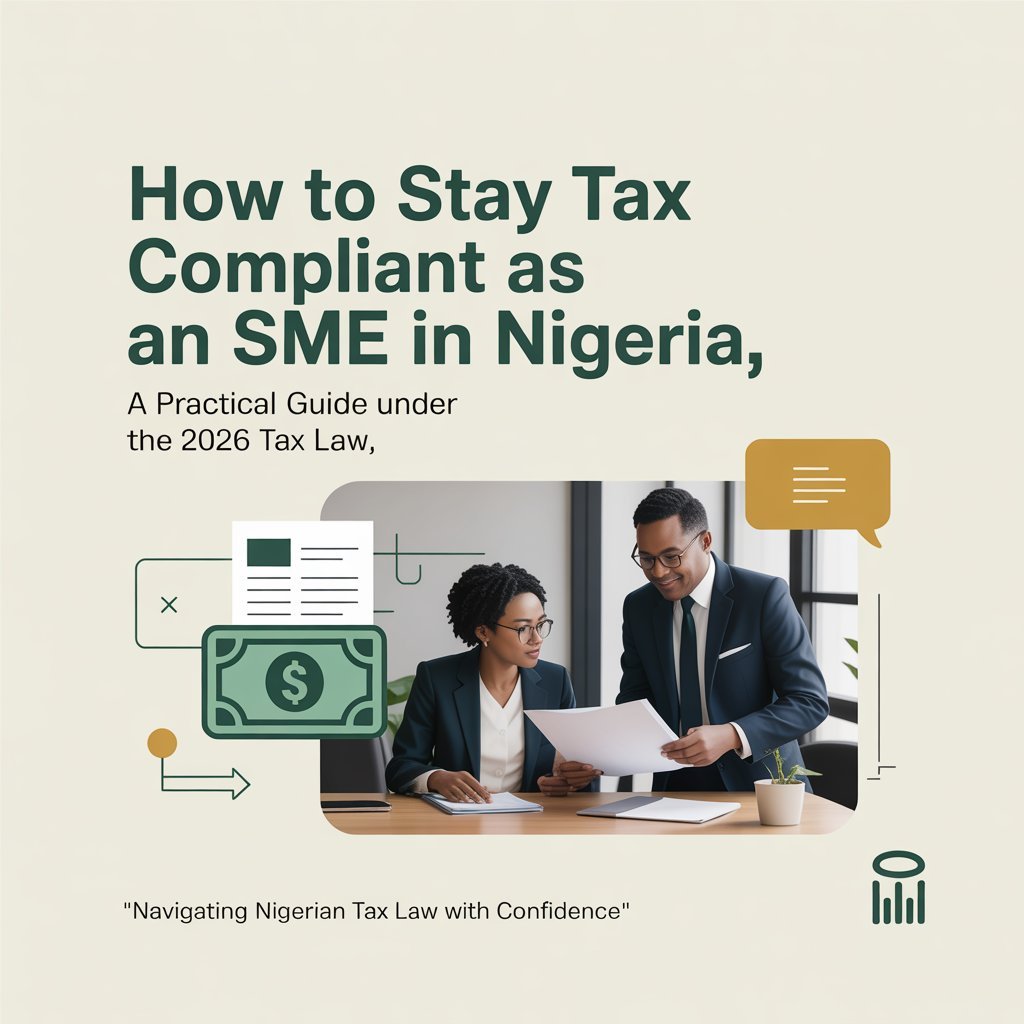
How to Stay Tax Compliant as an SME in Nigeria: A Practical Guide Under the 2026 Tax Law
1. Know If You Qualify as an SME
Before you take any action, determine whether your business fits the definition of an SME under the new law:
– Annual Turnover: Not more than ₦100 million
– Fixed Assets: Not exceeding ₦250 million
– Ownership: Nigerian-owned and not a subsidiary of a larger company
Why it matters:
– 0% Company Income Tax (CIT)
– Exemption from Capital Gains Tax
– Exemption from Development Levy
– Simplified reporting obligations
2. Register Properly & Get Your TIN
A Tax Identification Number (TIN) is mandatory for all businesses and individuals involved in any trade or service—even digital services offered from outside Nigeria.
Penalty for non-registration:
– ₦100,000 for the first month
– ₦50,000 for each additional month
Tip: Register early through FIRS or LIRS platforms to avoid penalties.
3. File the Right Tax Returns
Your business must file the appropriate tax returns regardless of your exemption status:
– Company Income Tax (CIT) – Annually, even if you’re paying 0%
– Personal Income Tax (PIT) – Especially for sole proprietors and partnerships
– Value Added Tax (VAT) – If annual turnover exceeds ₦25 million
– Withholding Tax (WHT) – For certain expenses like rent or professional services
– PAYE and Pension Contributions – For businesses with staff
Penalty for late filing:
– CIT: ₦25,000 for the first month, ₦5,000 for each additional month
– PIT: Up to ₦500,000 for non-compliance
4. Register & File VAT If You Cross ₦25M Revenue
If your business earns over ₦25 million in a 12-month period, VAT registration is mandatory.
Rate: 7.5%
Benefit: You can reclaim input VAT if registered
Tools: Use e-invoicing and fiscalisation tools for accurate reporting
Penalty for non-filing:
– ₦50,000 for the first month
– ₦25,000 for each subsequent month
5. Maintain Proper Books & Use E-Invoicing
Whether or not you’re required to audit your accounts, record-keeping is compulsory.
The FIRS now requires:
– E-invoicing systems
– Digital records of sales and expenses
Use simple accounting software tailored to small businesses to stay compliant with ease.
6. Know Your WHT Responsibilities
If you pay for services like rent, consultancy, or contracts, you must deduct Withholding Tax (WHT) and remit it to the tax authorities—even if you’re not VAT-registered.
Penalty for failure to remit:
– 10%–40% of the tax amount not deducted, plus interest
7. Don’t Assume Exemptions—Claim Them Properly
Yes, there are exemptions, but they’re not automatic! These include:
– 5-year tax holiday for agricultural SMEs
– Incentives for reinvestment, R&D, and employee training
But: You must apply officially, provide supporting documents, and get approval.
8. Respond to Tax Notices Promptly
Tax authorities (FIRS, LIRS, etc.) can now send electronic notices, request records, or initiate audits.
Failure to respond can lead to:
– Account freezes
– Estimated tax assessments
– Full investigations
Always treat tax notifications as urgent.
9. Be Ready for Cross-Checks
Under the 2026 law, tax authorities can now cross-match data from:
– Banks
– BVN, CAC, Customs, NIMC
– Your declared tax returns
Tip: Make sure your bank activity aligns with your tax filings to avoid red flags.
10. Get Professional Help or Training
Many SMEs pay more—or less—than they should because they lack the right support.
Solutions:
– Hire a qualified accountant or tax advisor
– Attend training sessions (like our Accountant Step-Up 😉)
– Use verified FIRS/LIRS online platforms for returns and guidance
Final Tips for SME Owners
– Stay registered and informed
– Keep accurate digital records
– File all required tax returns, even if you pay 0%
– Don’t ignore official notices or reminders
– Use your tax compliance to boost your credibility with banks, investors, and grant providers
Want help simplifying your SME tax process?
Follow @accountingnsync for expert insights and training opportunities tailored to Nigerian businesses.

